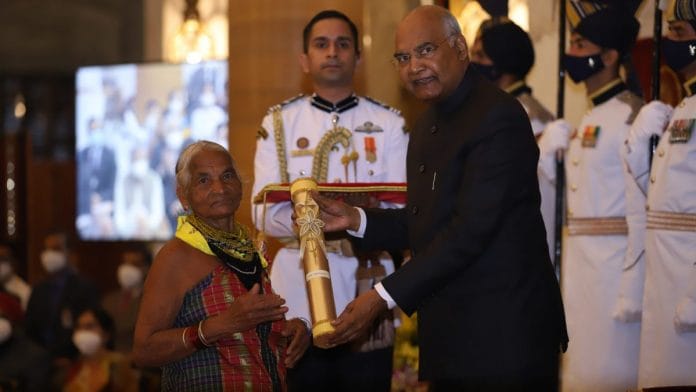What does Karan Johar have in common with Sharif Chacha and Tulasi Gowda? Now, a Padma Award.
On 8 November, President Ram Nath Kovind conferred the prestigious civilian awards in New Delhi to the 2020 and 2021 recipients. The Padma Vibhushan, Padma Bhushan, and Padma Shri are the highest civilian awards – after the Bharat Ratna – recognising the contributions to various fields like social work, science, medicine, literature, sports, and art.
The list of winners has made headlines all week, signalling that it’s no longer an award reserved for the elite. The inspiring stories of the winners — from the barefoot environmentalist from Karnataka Tulasi Gowda and transgender folk artist Manjamma Jogati to “elephant man” Dr Kushal Konwar Sarma and orange seller and school builder Harekala Hajabba — prove that the awards truly honour significant achievements to India’s heritage and development.
Even industrialist Anand Mahindra, who would have been considered a typical recipient of the award five years ago, tweeted that he felt “undeserving” of the award in comparison to the individuals “making seminal contributions to the improvement of society at grassroots levels.” That’s why the “Peoples’ Padma” is ThePrint’s Newsmaker of the Week.
Also read: For Harekala Hajabba, journey from orange cart to Padma Shri began with a foreigner’s question
Democratising the Padma Awards
Since the Padma Awards were first introduced in 1954, the type of awardee has slowly been changing. Counting former president APJ Abdul Kalam and Nobel Prize-winning economist Amartya Sen among its winners, the awards have begun recognising a wider range of people.
A major reason is that the awards themselves have become more democratic. While it had already begun honouring more Indians who weren’t popularly known, the Narendra Modi government launched a website in 2017 where people could nominate candidates. The selection process was also changed, and the Padma Awards Committee was expanded. That year, winners included “granny with a sword” Meenakshi Amma who had been practising and teaching Kalaripayattu for about 70 years, and folk singer Sukri Bommagowda, the “nightingale of Halakki,” for preserving cultural heritage and social activism.
The number of nominations for the Padma Awards has also increased manifold. The government received 46,000 nominations for the 2020 awards — in 2014, there were only 2,200 nominations. The government also launched the Padma Quiz in 2018, an online quiz that allows winners to attend the Padma Award ceremony in person at Rashtrapati Bhavan.
From nominating deserving people to getting a chance to attend the awards ceremony, the government has changed the way people interact with the awards itself. They are now being referred to as “Peoples’ Padma” because they’re beginning to represent the best of what India’s 1.4 billion population has to offer — and not just the elite.
This has clearly struck a chord. Videos of Manjamma blessing President Kovind went viral, and social media users have been celebrating unconventional winners as unsung heroes. It’s proof that Indians like seeing public winners reflect the country’s diverse social fabric — instead of highlighting how far we have left to go, it’s a moment of congratulations for getting this far.
Encouraging people to participate in the award process has made it more accessible, and rightfully more audacious. Those who would never have considered themselves winning some of the country’s highest civilian awards now can.
Also read: Day after Padma Shri, Haryana wrestler starts protest in Delhi over ‘unfair’ treatment by state
Rule of experts
That said, it’s important to note that the majority of the award recipients are more run-of-the-mill. This might be an ironic statement about people receiving an award for extraordinary achievements.
Even if they don’t like to admit it, government-led awards tend to favor a certain type of person: popular, well-educated, well-respected, and well-connected. Having influential friends is almost a prerequisite to being considered, and some pro-government campaigning also helps (à la Kangana Ranaut.)
Civilian awards are also sometimes used as bargaining chips. In fact, the United Kingdom has a well-documented history of swapping civilian awards for favours. Just earlier this year, Prince Charles’ closest aide quit his job after it was found that he offered a knighthood to a Saudi businessman who had donated £1.5 million to their charities.
This isn’t to say that the more predictable winners are not deserving. They have undoubtedly contributed to their field of expertise in some way, even if it’s debatable. However, academic and political theorist Timothy Mitchell, in his book Rule of Experts, wrote about how theoretical knowledge and expertise can actually work adversely in different contexts. A top-down, generalised approach to a hyper-specific local problem might not fix it, but a bottom-up approach by someone with a lived experience might.
Following this argument, the recipients of the 2020 and 2021 Padma Awards are definitely worthy of the tribute. Who better to honour for environmentalism than an indigenous person who works tirelessly to protect the forest? And who would understand the true nature and necessity of social work better than an 82-year-old Dalit activist and leader (M.K. Kunjol)?
They are also experts — even if they don’t have elite degrees or top connections. And they are finally being recognised and celebrated through the Padma Awards.
Views are personal.
(Edited by Prashant)






